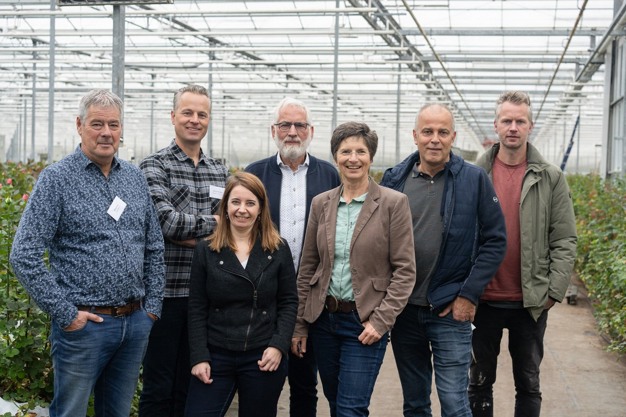In the framework of the Interreg project Agropole Innovates, the project partners Agrobusiness Niederrhein, Brightlands Campus Greenport Venlo, and the municipality of Venray invited interested parties to Van der Hulst's rose nursery in Meterik, Limburg, on October 25, 2023. More than twenty participants with diverse backgrounds from Limburg and the bordering German region of Lower Rhine attended.

From left to right: Eef Zwinkels (Royal Brinkman), Koen van der Hulst, Yvonne van der Velden (Brightlands Campus Greenport Venlo), Sjaak van der Hulst, Dr. Anke Schirocki (Agrobusiness Niederrhein), Marcel Claus (Municipality of Venray), Paul van der Hulst (photo: Agrobusiness Niederrhein)
The climate inside a greenhouse results from a combination of temperature and humidity. Plants absorb water through their roots and bring it to the leaves, where it evaporates. Evaporation is necessary for growth, but it also increases the humidity in the greenhouse, which in turn reduces further evaporation. With high humidity, the risk of fungal diseases affecting the plants is also higher, and there's a greater need for energy to reach the desired temperature.
Growers usually open the screens and windows on the roof of their greenhouse to regulate the humidity, but this costs a lot of energy. That is what led to the development of the DryGair device, whose energy-saving operation was presented during the meeting by Eef Zwinkels from Royal Brinkman.
Anke Schirocki, Director of Agrobusiness Niederrhein, welcomed the exchange between representatives of nurseries, universities, research institutions, and entrepreneurs from the supply industry and agribusiness services. "The exchange between different links of the agribusiness value chain is exactly what we wanted to promote with this project," said Schirocki.
Royal Brinkman presents a solution for energy-saving air dehumidification
When Eef Zwinkels showcases the DryGair system, he clearly knows what he is talking about. He grew up in a horticultural company and has worked in horticulture his entire professional life. DryGair uses much less energy than humidity control via ventilation. To extract four liters of water from the air, the device requires 1 kW. According to Zwinkels, up to 50% of energy can be saved. "The device hangs above the crop and sucks in greenhouse air through the grilles on the sides of each unit. The moisture condenses on these grilles, and the unit blows out slightly warmer air at the top. Additional advantages are that CO2 remains in the greenhouse for longer and that the water can be reused as clean irrigation water."
The EU's eco-design regulations have forced companies to switch to energy-saving lighting from 2023. That is why LED lamps will be chosen more often when purchasing new lamps. These generate less heat and, therefore, do not contribute to increasing the room temperature or lowering the relative humidity, as older lamp systems did in the past. This is another aspect that makes it interesting to dehumidify the air.
The device is already being used successfully at Van der Hulst's rose company. Roses are grown at three locations, and a total of 24 DryGair units have been installed. Van der Hulst is a true family business. Sjaak closed his nursery near Westland in 1992 and moved to North Limburg. His four children are all active in the company today. His sons Mark, Koen, and Paul each run one company, all three of which are part of a joint holding company. His daughter Linda, and also his daughters-in-law, work in the administration. Sjaak is an all-rounder and works in the company's various departments as needed. All three business locations have achieved a high certification standard with MPS-A+ and MPS-GAP and place great emphasis on collaboration, craftsmanship, and quality.
They have already gained plenty of experience with DryGair because a lot of emphasis is placed on optimal climate management. Each of the three companies grows several rose varieties with very similar cultivation requirements. Dry air and optimal temperatures ensure that the plant does not grow too quickly and with soft tissue but more slowly, which results in stronger stems and high-quality flowers. The goal is to grow sustainable, innovative, large-flowered roses.
If you want to be sure that the roses you are getting are from Van der Hulst, you can come to the nursery. Sjaak's wife, Cleta, and her team sell the roses at a modern store located right next to the nursery, where customers can buy a wide range of roses and vases, and flower arrangements can also be ordered. A vending machine ensures that roses can be purchased 24/7. They couldn't be fresher, because the roses only have to make the short journey from the greenhouse to the store next door.
Duration and funding of the Agropole Innovates project
The Agropole Innovates project will run until August 2026 and, in addition to the project partners' own contributions, implemented within the framework of the Interreg VI program Deutschland Nederland, it is co-funded with 2.025 million Euro from the European Union, the Ministry of Economic Affairs and Climate (EZK), the Province of Limburg, the MWIKE NRW and the MB Niedersachsen.
